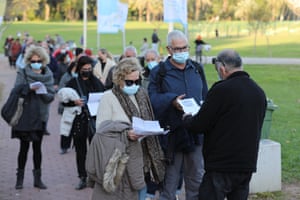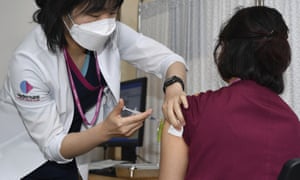Across the globe, governments are weighing up how they can convince sufficiently large numbers of people to take a Covid-19 vaccine in order to reach herd immunity.
But an international survey shows vaccine confidence is already on the rise even though relatively few countries have launched public awareness campaigns, with the fear of missing out on a jab suggested as one driver.
In the survey by Imperial College London, the share of respondents who “strongly agreed” to take a vaccine if it was offered to them has increased by eight percentage points or more in nine of the 14 countries surveyed between November and mid-February.
Vaccine confidence is exceptionally high in the UK, which has not just seen one of the globe’s smoothest-run immunisation rollouts but also a more proactive public information campaign than in other countries. As many as 70% of those surveyed expressed their eagerness to get a jab in the most emphatic way possible.

In Israel, which has already vaccinated half of its population against the coronavirus, confidence was similarly high, with 60% of those surveyed agreeing very strongly to take the vaccine if it was offered to them in the week of the survey.
But the survey shows that scepticism is also melting away in countries where vaccination campaigns have made a more sluggish start, such as in Germany, the Netherlands, Italy and Sweden.
Across the countries surveyed, willingness to take a vaccine correlates strongly with an anticipated regret of not getting a Covid-19 jab when it becomes available, suggesting the latter could be a key driver in changing attitudes.
“Regret from not doing something can have an even stronger effect on people’s health behaviours than perceptions of risk or negative emotions such as guilt and disappointment,” said Sarah Jones, a researcher at Imperial’s Faculty of Medicine who designed the survey.
“It’s plausible that as willingness to be vaccinated in the future increases, the objects of our potential regret are becoming more salient to us: might I regret missing another birthday party, another funeral, another hug?”
Noel Brewer, a professor in health behaviour at the university of North Carolina, said: “Governments are the most important organisations in charge of vaccine confidence. But they are not the only factors at play: the impression of scarcity can also drive up the prestige of being vaccinated. The risk is that scarcity can also demoralise people if they feel they will never get a chance to be vaccinated.”
Vaccine hesitancy remains relatively high in France, with Imperial College’s survey showing it to be the only country where more people strongly disagreed with receiving an available jab than those who strongly agreed.
But French hesitancy has also been falling steadily since some surveys last year suggested as few as four in 10 people would be willing to get a jab as soon as one became available.
Studies show vaccine hesitancy correlates strongly with a lack of trust in government and state institutions, and experts have suggested that time and vaccine envy could prove more effective at overcoming hesitancy than strident government messaging.
Vaccine hesitancy is also prevalent in high-income countries in Asia, with a lower percentage of the population expressing a willingness to take the vaccine soon in Japan, South Korea and Singapore.
In Japan, where the vaccination drive will not start until early April, only 5% of those surveyed said they very much trusted Covid-19 vaccines in general, compared with 48% in the UK, though here too confidence has been on an upward trajectory since mid-January.

While Japan doesn’t have an anti-vaxxer movement comparable with those in Europe or the US, there is a relatively high level of vaccine hesitancy due to the country’s experience with the MMR and HPV vaccines.
The health ministry stopped offering the combined MMR inoculations in the early 1990s after a number of children suffered adverse reactions. The government then lost a series of high-profile compensation cases brought by the families of children who had died or been left with serious disabilities. The side-effects were rare and some were reported as vaccine-related when they should have been attributed to other causes. But official nervousness over lawsuits and sensationalist media coverage helped spread scepticism among Japanese parents.
In South Korea, where only 31% expressed a willingness to take the vaccine if it was made available, the government has also opted to delay the rollout while it observes possible side-effects in other countries, in spite of ordering enough doses to inoculate all of the country’s 52 million people.
The delay is partly down to South Korea’s relative success in containing the outbreak. With infection rates much lower than in most of Europe, there has been no sense that an urgent mass vaccination programme is the country’s last chance to bring infections under control.
In Brazil, where President Jair Bolsonaro has repeatedly undermined vaccination, the latest polls show that 79% of Brazilians intend to get vaccinated despite his stance. That is down from 89% last August, however, suggesting the president’s scepticism, particularly towards the China-produced Coronavac, has had an impact on the public mood.
According to the World Health Organization, the proportion of a country’s population that must be vaccinated to begin inducing herd immunity is still subject to research, though epidemiologists have offered figures between 70% and 90%.
Additional reporting by Jon Henley in Paris, Justin McCurry in Tokyo and Tom Phillips in Rio de Janeiro
